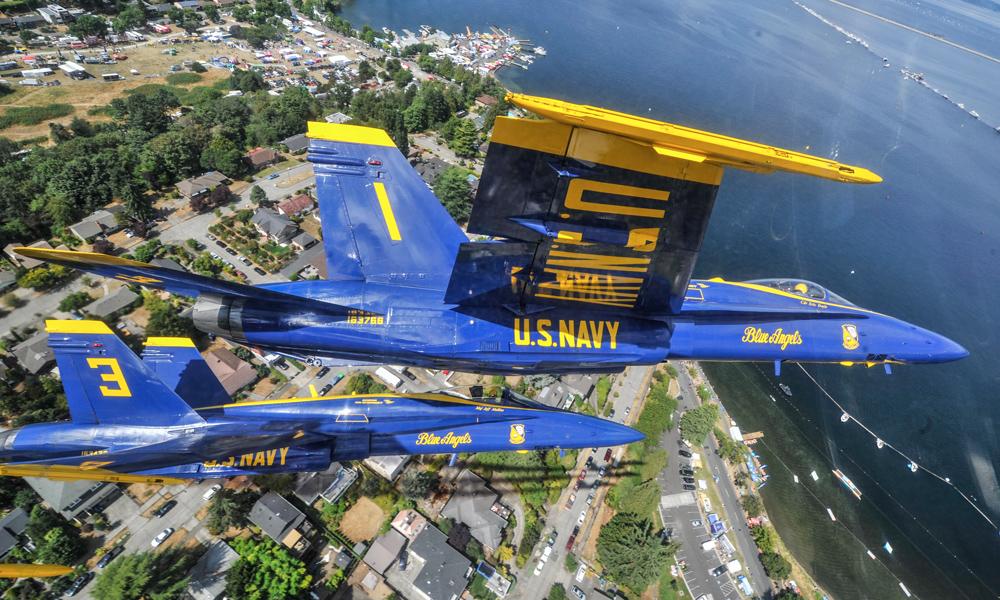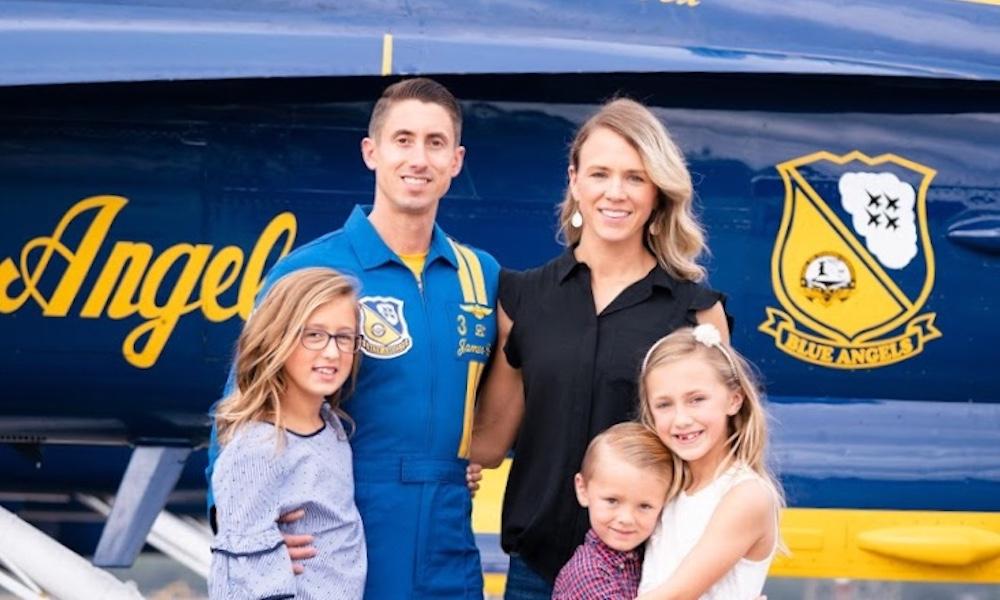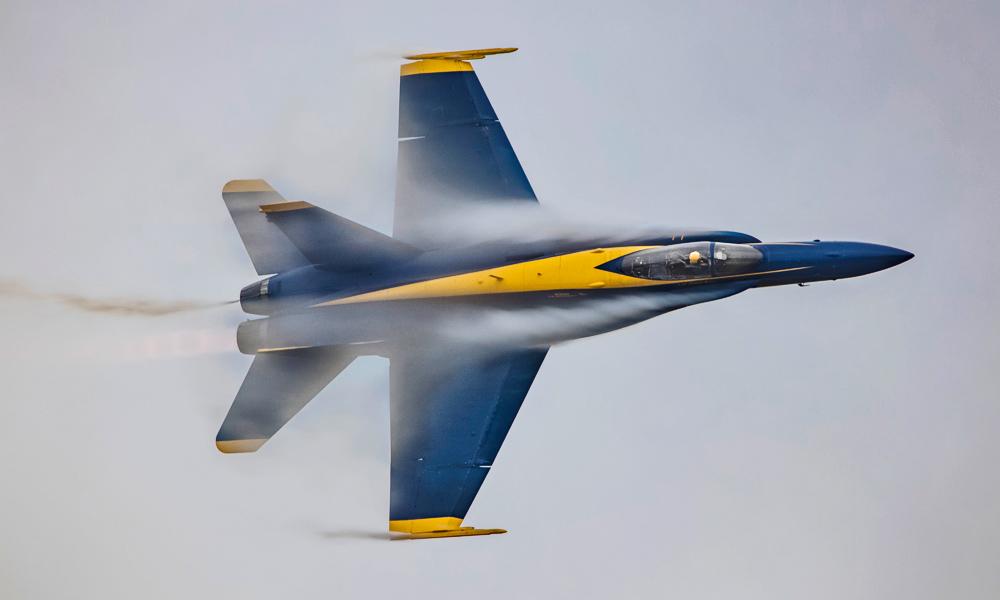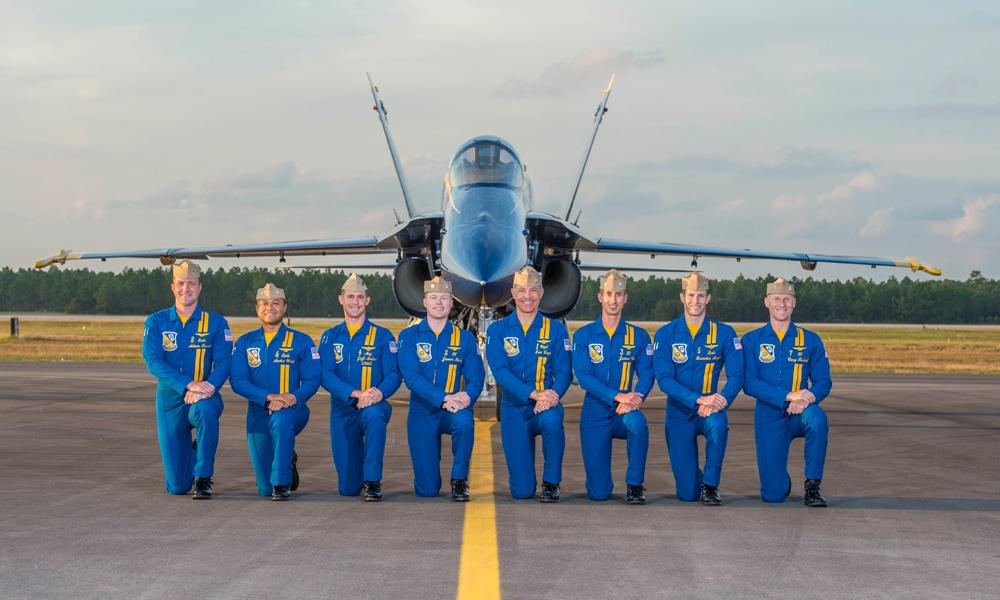Becoming a Blue Angel
Nation and World
SUMMARY: Lt. James Cox (’05) represents the grit and resilience of those in public service. Now a Blue Angel, Cox credits both JMU and the Navy for the success he has experienced throughout his military career.
By Sarah Chase (’17)
Lt. James Cox (’05) always knew he wanted to join the Navy. But he never expected he would one day showcase the pride and professionalism of naval aviation as a Blue Angel. On Sept. 11, 2018, Cox joined 15 other pilots in the famed flight demonstration squadron. He has nothing but gratitude as he looks back on the road that led him there.
Cox grew up in Chesapeake, Virginia, with a heritage of military experience—his grandfather, grandmother and father all served in the military. When choosing a college, he looked everywhere on the East Coast.
Cox said, “I almost immediately knew I wanted to go to JMU when I stepped onto campus. It was beautiful… and the atmosphere was so much more lively than other campuses.”

After a tour, Cox already felt a sense of community and knew JMU was where he wanted his home to be for the next four years. “I sought JMU for the community that I felt from day one.”
In 2005, Cox graduated with a Bachelor of Science in public administration and worked in sales and consulting in Arlington, Virginia, where he eventually met his wife, fellow Duke Jennifer Fields (’05, ’06M). At this point, Cox realized he was ready to pursue his Navy dream and applied to Officer Candidate School in Newport, Rhode Island. He graduated in 2009 and transitioned from civilian life to a military career.

After earning his wings in 2011, Cox served the Navy in multiple capacities before reporting to Naval Air Station in Fallon, Nevada, for the U.S. Navy Fighter Weapons School, known as TOPGUN. Upon completion in 2016, he reported to Strike Fighter Weapons School Atlantic, serving as a tactics instructor, subject matter expert on combat jet weapons systems and an airborne instructor.
Cox attributes his success to grit, dedication and others’ beliefs in his abilities.
“I remember professors at JMU asking how they could help me succeed,” he said. “They took time to sit down and help me do better. I still think about that every day.”
Cox is also appreciative of the opportunities the Navy afforded him. “It is a culture that promotes professionalism and breeds success to those who have the drive to succeed. In addition to hard work and determination, I am very grateful to the leadership and role models who have helped me get to where I am,” he said.
|
"It’s the sense of community and desire to positively affect the lives of others that will always matter." |
Cox was encouraged to apply to be a Blue Angel, but being qualified to even apply takes an impressive résumé.
Each applicant must be a career-oriented, carrier-qualified and active-duty Navy or Marine Corps tactical jet pilot with a minimum of 1,250 flight hours. After applicants are selected to join the team, they undergo rigorous training—flying two to three times a day for six months—before touring. Officers generally serve two to three years, while enlisted personnel serve three to four years.
“After completing a tour with Blue Angels, both officers and enlisted [personnel] return to the fleet,” Cox said.
The Blue Angels were established in 1946 under order from Adm. Chester W. Nimitz, chief of naval operations, to keep the public interested in naval aviation. In its 73-year history, the team has served as ambassadors of goodwill across the globe. Flight demonstrations showcase the excellence, teamwork and professionalism found in all Navy and Marine Corps units. The team also prioritizes visiting hospitals, schools and community functions in each air show city. Since its inception, the team has flown for more than 450 million spectators and had countless interactions with schools, students and communities to inspire leadership and military appreciation.

This is one aspect that Cox is most excited to represent and something he ties back to his experience at JMU. “JMU’s whole message, its sense of community outreach, creativity, resilience and optimism, means a lot to me.”
The academic experience is one that every college student has, but it was outside of the classroom where Cox felt he gained life and character-building qualities. As an active member of Alpha Kappa Lambda, Cox learned skills such as conducting himself professionally and being an outstanding citizen.
Now, as a Blue Angel, Cox represents the grit and resilience of the men and women in service and acknowledges that the belief and encouragement of others helped him get there.
“I’ve been humbly afforded this opportunity,” he said. “But this goes beyond the scoreboard, beyond the field, beyond the office and beyond the cockpit. It’s the sense of community and desire to positively affect the lives of others that will always matter.”
For Cox, becoming a Blue Angel really has been about life beyond the cockpit. “JMU has this saying about Being the Change, but you can’t ‘be the change’ unless you are the change. If you aren’t already living in that capacity, you have to embody it yourself.”
Cox sees this as leading from behind, embracing the unglamorous job of hard work and accepting that setbacks are part of the journey. “I think that’s why I’m most excited to get into the community as a Blue Angel and share my story of failures and growth,” he said. “If I’m able to affect the life of just one person, it’s worth it.”
